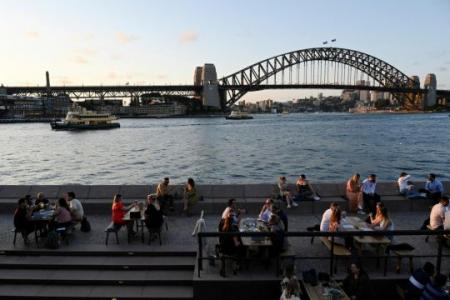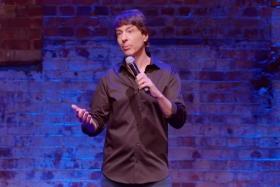Australia debates Covid-19 fees for unvaccinated by choice after move by Singapore
SYDNEY - Singapore's decision to require Covid-19 patients who are unvaccinated by choice to pay their medical expenses has sparked debate in Australia about whether to apply similar rules and end free treatment for the vaccine hesitant.
Following Singapore's announcement, former foreign minister Bob Carr called for Australia to follow suit. He said the Australian public should not be forced to pay for the "wilful stupidity" of those who refuse to be vaccinated.
"Follow Singapore and legislate no medical or hospital expenses to be reimbursed to people who are not vaccinated without medical justification and then contract Covid," he said on Twitter. "You ignored warnings and got the disease."
Health economist Luke Slawomirski also backed moves to force unvaccinated patients to pay for their care. He proposed that those who are unvaccinated without an exemption should pay an additional annual tax, similar to extra income taxes that are levied onAustralians who do not have private health insurance.
"This would ensure continued access to care while recouping some of the financial burden created by refusing to participate in a mainstream, evidence-based public health intervention," he wrote on the Crikey news website.
"Politically it's a signal that there exist a small number of democratic obligations that, if adhered to by everyone, generate the many freedoms we enjoy."
Australia has high vaccination rates despite being relatively slow to begin its rollout. As of Friday (Nov 12), 82 per cent of Australian residents aged 16 and over were fully vaccinated and 90 per cent have had at least one dose.
The two most populous states, New South Wales (NSW) and Victoria, have been battling outbreaks of the Delta strain but recently ended lockdowns as their vaccination rates increased. In NSW, where 286 local cases were recorded on Friday, 91 per cent of eligible residents are fully vaccinated. In Victoria, which had 1,115 new cases, 85 per cent are vaccinated. The vast majority of Covid-19 patients in intensive care in NSW and Victoria are unvaccinated.
Other states and territories have lower vaccination rates, but are largely free of local outbreaks.
Despite a negligible but vocal group of politicians and commentators condemning moves to limit freedoms for unvaccinated people, the vaccine roll-out has largely proven uncontroversial. NSW is expected to have a vaccination rate of more than 95 per cent.
Prime Minister Scott Morrison has rejected calls to impose costs on those who are unvaccinated, saying he strongly urged people to be vaccinated but did not want to "demonise" those who choose not to.
"We live in a country where we're not going to demonise people for making their own choices," he told Channel Seven. "We don't have a mandatory vaccine policy… Of course we want people to get vaccinated but we're not going to take that heavy-handed approach."
Singapore will require those who are unvaccinated by choice to pay medical bills if they become ill with Covid-19 from Dec 8, in a move aimed at encouraging vaccination among those who are hesitant.
The Ministry of Health (MOH) told The Straits Times that medical bills could be about $25,000, but this amount could reduce substantially to about $2,000 to $4,000 after subsidies and insurance. The $25,000 is the median acute hospital bill size for those who require both ICU care and Covid-19 therapeutics, MOH said.
Dr Stephen Duckett, a health policy expert from Grattan Institute, an independent think-tank, said he believed charging unvaccinated patients was "a bridge too far". He said vaccination rates were lower among poorer and less educated residents who may either struggle to find time away from their jobs to get vaccinated or "are more susceptible to misinformation campaigns".
"If we exclude the unvaccinated … tomorrow we might exclude the smoker, the day after the drinker, or the person who did not go out jogging, or has not taken up private health insurance," he wrote on The Conversation website.
"The health system needs to be there for everyone, not just … for people whose choices we endorse."
Rejecting this argument, Mr Slawomirski said verifying vaccination status was straightforward and could be used as a factor in charging healthcare fees. In contrast, he said, smoking or poor diet was "difficult to quantify objectively… and potentially difficult for individuals to change".
Get The New Paper on your phone with the free TNP app. Download from the Apple App Store or Google Play Store now



